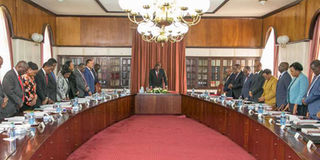Uhuru, Cabinet approve trade treaty for lawmakers to ratify

President Uhuru Kenyatta and Deputy President William Ruto during a Cabinet meeting at State House, Nairobi, on March 27, 2018. PHOTO | PSCU
What you need to know:
The austerity measures, the Cabinet said, would make sure Kenya lives within its means.
The trade deal also binds state parties to eight objectives, including the progressive elimination of tariffs and non-tariff barriers to trade.
When fully implemented, the treaty is expected to enable citizens of African Union member countries to enjoy the convenience of a single passport and currency.
President Uhuru Kenyatta on Monday chaired his Cabinet for the first time since taking the oath of office four months ago.
The ministers and the President approved the Africa Continental Free Trade treaty for ratification by the National Assembly.
“The bill for ratifying the treaty, which was signed in Rwanda by 44 countries, will be presented to Parliament in the next few days,” State House said after the Cabinet approved it.
The ministers also approved a supplementary budget to reduce borrowing and focus on President Kenyatta’s Big Four projects: Universal healthcare, affordable housing, food security and manufacturing.
The austerity measures, the Cabinet said, would make sure Kenya lives within its means.
PUBLIC DEBT
The country’s total public debt stood at Sh4.57 trillion at the end of December 2017, three times the Sh1.44 trillion projected tax revenue for 2018.
“The proposed revision to the 2017/18 financial year will regularise approved expenditure and ensure micro-economic stability,” a statement from State House said.
“Further borrowing will be contained and a fiscal deficit of 7.2 per cent of Gross Domestic Product will be maintained.”
The continental trade treaty will come into effect when it is ratified by 22 countries.
The meeting, which was also attended by Deputy President William Ruto, urged the private sector to take advantage of the business opportunities presented by the treaty to extend Kenya’s foothold in the 54 African countries.
“It is a great opportunity to export goods and services to the region and the continent,” the Cabinet said in a statement.
LIBERALISED MARKET
The treaty will establish a single liberalised market expected to spur industrialisation, infrastructure development, economic diversity and trade across the continent that is home to more than 1.2 billion people.
The pact also seeks to promote industrialisation through regional value chain development, agriculture and food security.
When fully implemented, the treaty is expected to enable citizens of African Union member countries to enjoy the convenience of a single passport and currency.
The trade deal also binds state parties to eight objectives, including the progressive elimination of tariffs and non-tariff barriers to trade.
SETTLING DISPUTES
Under the agreement, countries will establish a mechanism for settling disputes concerning their rights and obligations.
The Cabinet also approved for ratification the tripartite free trade agreement bringing together the Common Market for Eastern and Southern Africa, the Southern African Development Community and the East African Community.
Also approved by the ministers was the County Retirement Benefits Bill, which will establish an umbrella pension scheme for county employees. The proposed bill, which will give legal backing to the defined contribution scheme, was also approved for forwarding to Parliament.




